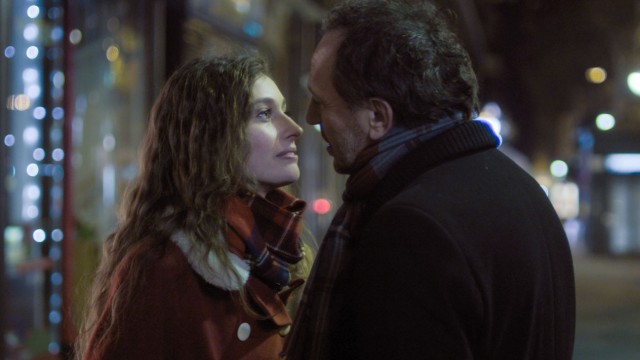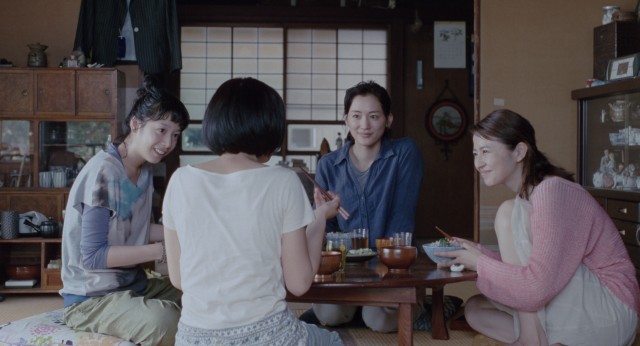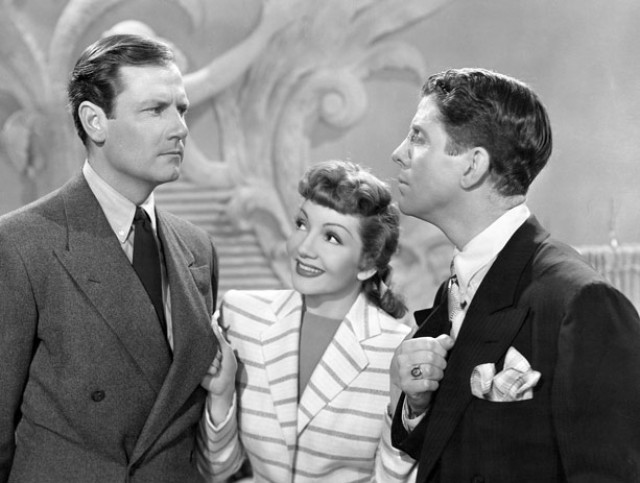
Gabrielle (Louise Coldefy) and Arnaud Viard (Arnaud Viard) explore acting and more in PARIS, LOVE, CUT
CINÉSALON: PARIS, LOVE, CUT (ARNAUD FAIT SON 2ÈME) (Arnaud Viard, 2015)
French Institute Alliance Française, Florence Gould Hall
55 East 59th St. between Madison & Park Aves.
Tuesday, July 12, $14, 4:00 & 7:30 (later screening introduced by Alan Brown)
Series continues Tuesdays through July 26
212-355-6100
fiaf.org
 “I like mixing fiction and reality,” writer, director, and star Arnaud Viard says in his second film, Paris, Love, Cut, the French title of which is Arnaud fait son 2ème film, or “Arnaud Makes His Second Film.” As the movie opens, Viard, sitting on the toilet, says directly into the camera, “Sometimes, in life, nothing works. You struggle . . . Nothing. Then, one day, it all flows. Just like that. Fluid. Magnificent. As if you were constipated, then suddenly . . . not at all. Last time things flowed was when I made my first film.” A longtime television actor who made his biggest impact as Jean-François in the French series Que du bonheur, Viard released his debut feature, Clara et moi, in 2004, then experienced difficulties raising money for his follow-up. In Paris, Love, Cut, Viard plays a version of himself, a longtime television actor who made his biggest impact as Jean-François in the French series Happy Times and who released his debut feature in 2004, then experienced difficulties raising money for his follow-up. Viard is trying to have a baby with his girlfriend, Chloé (Irène Jacob), but she is having trouble getting pregnant, echoing his inability to give birth to his second film, which he decides will be about a man unable to get an erection. He takes a job teaching an acting class, where he falls for twenty-one-year-old student Gabrielle (Louise Coldefy), whose goal is to become a famous actress. As he meets with his producer (Christophe Rossignon), other directors, his ailing mother (Nadine Alari), a sex coach (Chris Esquerre), a psychoanalyst (Pierre Aussedat), a tax agent (Marie-Christine Laurent), his sisters, and various dates, he has a generally positive take on life; he is soft-spoken and gentle, with a fun sense of humor whether being audited or going to a party thrown by his students, one of whom (Hamza Meziani) gets to the heart of the matter when he delivers a monologue from Alfred de Musset’s Don’t Fool with Love: “All men are liars, false, fickle, hypocritical, cowardly, contemptible, sensual. All women are faithless, deceitful, vain, curious, and depraved. The world is a bottomless sewer where shapeless beasts writhe on mountains of filth. But one thing is holy and sublime, the union of two beings, so imperfect and horrible.”
“I like mixing fiction and reality,” writer, director, and star Arnaud Viard says in his second film, Paris, Love, Cut, the French title of which is Arnaud fait son 2ème film, or “Arnaud Makes His Second Film.” As the movie opens, Viard, sitting on the toilet, says directly into the camera, “Sometimes, in life, nothing works. You struggle . . . Nothing. Then, one day, it all flows. Just like that. Fluid. Magnificent. As if you were constipated, then suddenly . . . not at all. Last time things flowed was when I made my first film.” A longtime television actor who made his biggest impact as Jean-François in the French series Que du bonheur, Viard released his debut feature, Clara et moi, in 2004, then experienced difficulties raising money for his follow-up. In Paris, Love, Cut, Viard plays a version of himself, a longtime television actor who made his biggest impact as Jean-François in the French series Happy Times and who released his debut feature in 2004, then experienced difficulties raising money for his follow-up. Viard is trying to have a baby with his girlfriend, Chloé (Irène Jacob), but she is having trouble getting pregnant, echoing his inability to give birth to his second film, which he decides will be about a man unable to get an erection. He takes a job teaching an acting class, where he falls for twenty-one-year-old student Gabrielle (Louise Coldefy), whose goal is to become a famous actress. As he meets with his producer (Christophe Rossignon), other directors, his ailing mother (Nadine Alari), a sex coach (Chris Esquerre), a psychoanalyst (Pierre Aussedat), a tax agent (Marie-Christine Laurent), his sisters, and various dates, he has a generally positive take on life; he is soft-spoken and gentle, with a fun sense of humor whether being audited or going to a party thrown by his students, one of whom (Hamza Meziani) gets to the heart of the matter when he delivers a monologue from Alfred de Musset’s Don’t Fool with Love: “All men are liars, false, fickle, hypocritical, cowardly, contemptible, sensual. All women are faithless, deceitful, vain, curious, and depraved. The world is a bottomless sewer where shapeless beasts writhe on mountains of filth. But one thing is holy and sublime, the union of two beings, so imperfect and horrible.”
Much of Paris, Love, Cut serves as personal and professional wish fulfillment for both the real and the fictional Viard — if there is a difference. Evoking a mix of Woody Allen’s Annie Hall and Manhattan, Nanni Moretti’s Caro Diario, and Caveh Zahedi’s I Am a Sex Addict, Viard lays his neuroses out there for all to see, primarily keeping it as lighthearted as the soundtrack, while also getting naked with some beautiful women. He pays homage to François Truffaut and The Last Metro while exploring a midlife crisis that isn’t really much of a crisis, which is not to say he isn’t facing some difficult situations and has to make some hard choices. But like the title of his real and fictional series, these are still some pretty happy times for him, in a pretty happy movie. FIAF is presenting the U.S. premiere of Paris, Love, Cut at 4:00 and 7:30 on July 12 in its CinéSalon series “Burning Bright: New French Filmmakers”; the later screening will be introduced by writer-director Alan Brown (Book of Love, Superheroes). The series continues Tuesday nights in July with Thomas Salvador’s Vincent and Jean-Charles Hue’s Eat Your Bones.


 “I like mixing fiction and reality,” writer, director, and star Arnaud Viard says in his second film, Paris, Love, Cut, the French title of which is Arnaud fait son 2ème film, or “Arnaud Makes His Second Film.” As the movie opens, Viard, sitting on the toilet, says directly into the camera, “Sometimes, in life, nothing works. You struggle . . . Nothing. Then, one day, it all flows. Just like that. Fluid. Magnificent. As if you were constipated, then suddenly . . . not at all. Last time things flowed was when I made my first film.” A longtime television actor who made his biggest impact as Jean-François in the French series Que du bonheur, Viard released his debut feature, Clara et moi, in 2004, then experienced difficulties raising money for his follow-up. In Paris, Love, Cut, Viard plays a version of himself, a longtime television actor who made his biggest impact as Jean-François in the French series Happy Times and who released his debut feature in 2004, then experienced difficulties raising money for his follow-up. Viard is trying to have a baby with his girlfriend, Chloé (Irène Jacob), but she is having trouble getting pregnant, echoing his inability to give birth to his second film, which he decides will be about a man unable to get an erection. He takes a job teaching an acting class, where he falls for twenty-one-year-old student Gabrielle (Louise Coldefy), whose goal is to become a famous actress. As he meets with his producer (Christophe Rossignon), other directors, his ailing mother (Nadine Alari), a sex coach (Chris Esquerre), a psychoanalyst (Pierre Aussedat), a tax agent (Marie-Christine Laurent), his sisters, and various dates, he has a generally positive take on life; he is soft-spoken and gentle, with a fun sense of humor whether being audited or going to a party thrown by his students, one of whom (Hamza Meziani) gets to the heart of the matter when he delivers a monologue from Alfred de Musset’s Don’t Fool with Love: “All men are liars, false, fickle, hypocritical, cowardly, contemptible, sensual. All women are faithless, deceitful, vain, curious, and depraved. The world is a bottomless sewer where shapeless beasts writhe on mountains of filth. But one thing is holy and sublime, the union of two beings, so imperfect and horrible.”
“I like mixing fiction and reality,” writer, director, and star Arnaud Viard says in his second film, Paris, Love, Cut, the French title of which is Arnaud fait son 2ème film, or “Arnaud Makes His Second Film.” As the movie opens, Viard, sitting on the toilet, says directly into the camera, “Sometimes, in life, nothing works. You struggle . . . Nothing. Then, one day, it all flows. Just like that. Fluid. Magnificent. As if you were constipated, then suddenly . . . not at all. Last time things flowed was when I made my first film.” A longtime television actor who made his biggest impact as Jean-François in the French series Que du bonheur, Viard released his debut feature, Clara et moi, in 2004, then experienced difficulties raising money for his follow-up. In Paris, Love, Cut, Viard plays a version of himself, a longtime television actor who made his biggest impact as Jean-François in the French series Happy Times and who released his debut feature in 2004, then experienced difficulties raising money for his follow-up. Viard is trying to have a baby with his girlfriend, Chloé (Irène Jacob), but she is having trouble getting pregnant, echoing his inability to give birth to his second film, which he decides will be about a man unable to get an erection. He takes a job teaching an acting class, where he falls for twenty-one-year-old student Gabrielle (Louise Coldefy), whose goal is to become a famous actress. As he meets with his producer (Christophe Rossignon), other directors, his ailing mother (Nadine Alari), a sex coach (Chris Esquerre), a psychoanalyst (Pierre Aussedat), a tax agent (Marie-Christine Laurent), his sisters, and various dates, he has a generally positive take on life; he is soft-spoken and gentle, with a fun sense of humor whether being audited or going to a party thrown by his students, one of whom (Hamza Meziani) gets to the heart of the matter when he delivers a monologue from Alfred de Musset’s Don’t Fool with Love: “All men are liars, false, fickle, hypocritical, cowardly, contemptible, sensual. All women are faithless, deceitful, vain, curious, and depraved. The world is a bottomless sewer where shapeless beasts writhe on mountains of filth. But one thing is holy and sublime, the union of two beings, so imperfect and horrible.”



 In such films as
In such films as 
 Writer-director Preston Sturges was on quite a roll in the early 1940s, making a string of memorable pictures that included The Great McGinty, Christmas in July, The Lady Eve, Sullivan’s Travels, The Miracle of Morgan’s Creek, and Hail the Conquering Hero. In the midst of that amazing run is The Palm Beach Story, one of the craziest of the classic screwball comedies. Running out of money, married couple Tom (Joel McCrea) and Geraldine (Claudette Colbert) Jeffers are preparing to leave their ritzy Park Ave. apartment until a straight-talking, shriveled old wienie king (Robert Dudley) hands Gerry a wad of cash so she doesn’t have to move out. She pays off their many bills, but Tom is suspicious of how she got the money, demanding to know if any sex was involved, a rather risqué question for a 1942 Hays Code-era romantic comedy. Gerry decides that she is no good for Tom and insists on getting a divorce even though they still love each other. So she grabs a train to Florida, meeting the wacky Ale & Quail Club and John D. Hackensacker III (Rudy Vallée), a kind, soft-spoken gentleman who takes a liking to her and helps her out of a jam. Things reach a manic pace as Tom heads to Palm Beach as well, trying to save the marriage while fending off the advances of the the Princess Centimillia (Mary Astor). McCrea and Colbert make a great comic duo in, displaying a fiery sex appeal that is still hot all these years later. What’s not hot is the film’s use of black characters, who are horribly stereotyped and are even referred to as “colored” in the credits. It might have been a different time, but there aren’t a whole lot of quality movies that were that blatant about it. In addition, the shooting scene with the Ale & Quail Club goes way over the top. But when the film focuses on Tom and Gerry, caught up in their own endlessly charming game of cat and mouse, The Palm Beach Story shines. The Palm Beach Story is screening July 11 at the Bryant Park Summer Film Festival, which continues Monday nights through August 22 with such other fab flicks as Richard Donner’s The Omen, Sydney Pollack’s Three Days of the Condor, and Clint Eastwood’s High Plains Drifter.
Writer-director Preston Sturges was on quite a roll in the early 1940s, making a string of memorable pictures that included The Great McGinty, Christmas in July, The Lady Eve, Sullivan’s Travels, The Miracle of Morgan’s Creek, and Hail the Conquering Hero. In the midst of that amazing run is The Palm Beach Story, one of the craziest of the classic screwball comedies. Running out of money, married couple Tom (Joel McCrea) and Geraldine (Claudette Colbert) Jeffers are preparing to leave their ritzy Park Ave. apartment until a straight-talking, shriveled old wienie king (Robert Dudley) hands Gerry a wad of cash so she doesn’t have to move out. She pays off their many bills, but Tom is suspicious of how she got the money, demanding to know if any sex was involved, a rather risqué question for a 1942 Hays Code-era romantic comedy. Gerry decides that she is no good for Tom and insists on getting a divorce even though they still love each other. So she grabs a train to Florida, meeting the wacky Ale & Quail Club and John D. Hackensacker III (Rudy Vallée), a kind, soft-spoken gentleman who takes a liking to her and helps her out of a jam. Things reach a manic pace as Tom heads to Palm Beach as well, trying to save the marriage while fending off the advances of the the Princess Centimillia (Mary Astor). McCrea and Colbert make a great comic duo in, displaying a fiery sex appeal that is still hot all these years later. What’s not hot is the film’s use of black characters, who are horribly stereotyped and are even referred to as “colored” in the credits. It might have been a different time, but there aren’t a whole lot of quality movies that were that blatant about it. In addition, the shooting scene with the Ale & Quail Club goes way over the top. But when the film focuses on Tom and Gerry, caught up in their own endlessly charming game of cat and mouse, The Palm Beach Story shines. The Palm Beach Story is screening July 11 at the Bryant Park Summer Film Festival, which continues Monday nights through August 22 with such other fab flicks as Richard Donner’s The Omen, Sydney Pollack’s Three Days of the Condor, and Clint Eastwood’s High Plains Drifter.